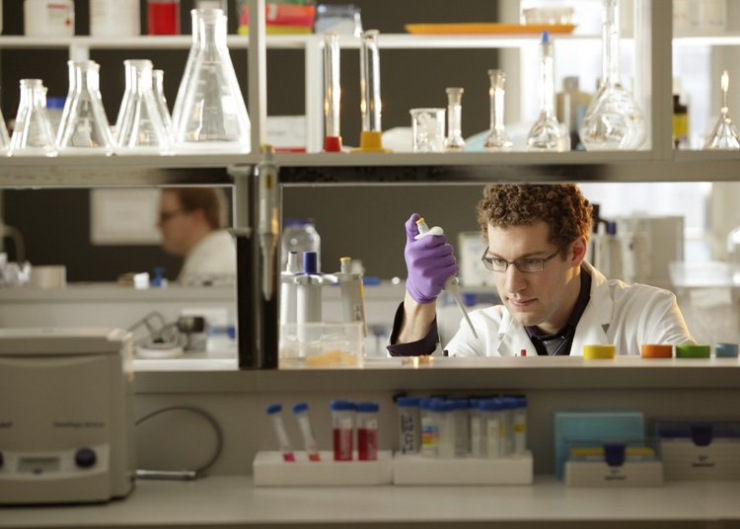Closely-held Soricimed Biopharma expects to initiate in the second quarter of 2018 a Phase 1b/2a clinical trial with its SOR-C13 drug candidate in patients with prostate cancer, including men who have failed first line treatment, as well as patients with advanced pancreatic and ovarian cancers.
“The protocol has been designed for early efficacy readouts,” Paul Gunn, president and CEO, says in an interview with BioTuesdays. “We received a very positive response from the FDA to our end-of-Phase 1 meeting submission package with the FDA, providing a clear pathway for our planned Phase 1b/2a clinical trials.”
Mr. Gunn says that the “rolling” study will recruit about 20 patients into the dose escalation Phase 1b portion to establish a maximum tolerable dose. Patients who respond will move into the Phase 2a portion along with additional patients for a total of about 60 patients in both arms of the study.
The two-year trial will be conducted at three-to-four clinical sites, primarily in the U.S., including MD Anderson Cancer Center in Houston. SOR-C13 has received orphan drug status from the FDA for ovarian and pancreatic cancers.
Mr. Gunn explains that SOR-C13 is a synthetic peptide based on a small protein discovered by Soricimed in the venomous saliva of the northern short-tailed shrew, which binds to the TRPV6 calcium ion channel. TRPV6 is implicated in the development and progression of numerous forms of solid tumor cancers, and its over-expression correlates with the aggressiveness of the disease.
“This onco-channel has emerged as a new target for treating and diagnosing various carcinomas,” he adds, noting that calcium-dependent proliferation of cancer cells is linked directly to TRPV6.
Mr. Gunn contends that SOR-C13 has been shown to reduce cancer cell proliferation and metastasis, and block anti-apoptotic pathways, that cancer cells use to avoid programmed cell death.
“SOR-C13 is the first ever TRPV6 inhibitor to enter clinical trials and represents a novel, first-in-class anticancer therapy.”
Soricimed owns all of its IP, including 17 issued patents, of which 11 are in the U.S., and four additional patents pending.
In an earlier Phase 1 study in 23 stage 3 and 4 cancer patients with advanced solid tumors known to express TRPV6, and representing 14 solid tumor types, SOR-C13 was shown to be safe and well tolerated after nearly 500 infusions, with no drug-related serious adverse events. All patients had failed prior therapy.
According to Mr. Gunn, 55% of evaluable subjects in the Phase 1 study had stable disease after 2 cycles of SOR-C13 treatment, with the duration of response ranging from 84 days to more than one year. “These were patients with progressive disease and we were able to stabilize them.”
One subject remained on treatment and in stable disease for 18 cycles of the drug, representing more than 12 months, with no safety or tolerability issues, he adds.
In addition, two patients with advanced pancreatic cancer enrolled in the Phase 1 study at MD Anderson showed stable disease after two cycles of SOR-C13. Mr. Gunn says one patient had a nearly 30% reduction in their primary pancreatic tumor. “This qualifies as a partial clinical response, which is a real marker of efficacy in these clinical trials.”
The tumor response also correlated very tightly with reductions in blood levels of CA 19-9, a validated pancreatic cancer biomarker, he adds.
Mr. Gunn says the results observed in pancreatic cancer patients were compelling enough that we have been approached by a major cancer center to start a physician-sponsored clinical trial this coming February. This would include 30 patients with late-stage pancreatic cancer to assess SOR-C13’s potential in this difficult to treat population. Soricimed will be provide the study drug and some financial support to the institution. The study is expected to take 18 months to complete.
Soricimed’s pipeline also includes development of TRPV6 targeting peptide drug conjugates (PDC) to deliver highly potent cell-killing payloads. “We believe PDC’s have a number of advantages over larger and bulkier monoclonal antibody-drug conjugates (ADC) – several of which are approved for cancer treatment,” Mr. Gunn says
PDC’s can have the same cancer-targeting and payload delivery properties as ADC’s but are essentially small molecules. “This means that PDC’s have better penetration of solid-tumors, than larger and bulkier monoclonal antibodies, and are easier and less expensive to manufacture,” he adds.
“What we’re doing is using peptides that target TRPV6, which is only expressed in cancer cells, and linking highly toxic drugs to them in order to achieve a targeted delivery to the tumor,” Mr. Gunn contends.
Soricimed’s lead PDC currently is SBI-1301. “We’re using an anticancer drug that failed in clinical trials conducted by a multi-national pharmaceutical company because it proved to be too toxic systemically,” he points out. “We believe we have the ability to target that drug at a low concentration to reduce its systemic exposure, but still have a highly potent agent.”
After achieving complete tumor regression in a prostate cancer mouse model with SBI-1301, the company plans to select a lead PDC and begin IND-enabling studies in the first quarter of 2018, with the goal of submitting an IND to the FDA in the second half and beginning clinical studies in early 2019.
Mr. Gunn says Soricimed is seeking to raised at least $15-million to complete the Phase 1b/2a trial with SOR-C13, conduct IND-enabling studies with its PDC candidate, file an IND and prepare to begin a Phase 1 study.
The company has two financing options under review, including a private placement or a public raise through a possible reverse takeover (RTO) of a shell company in conjunction with an initial public offering. “There are a number of RTO targets available if we take this route,” he adds.






